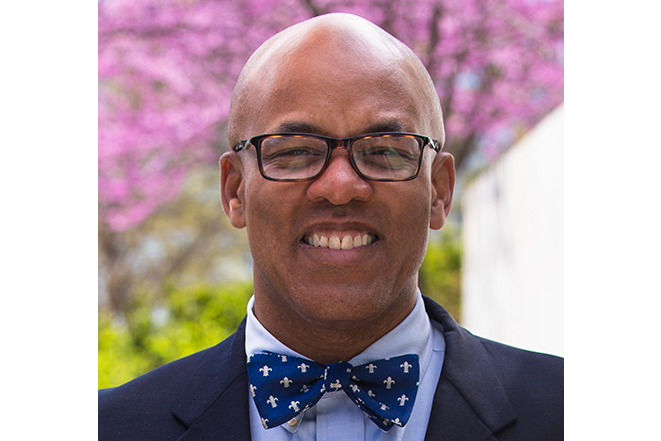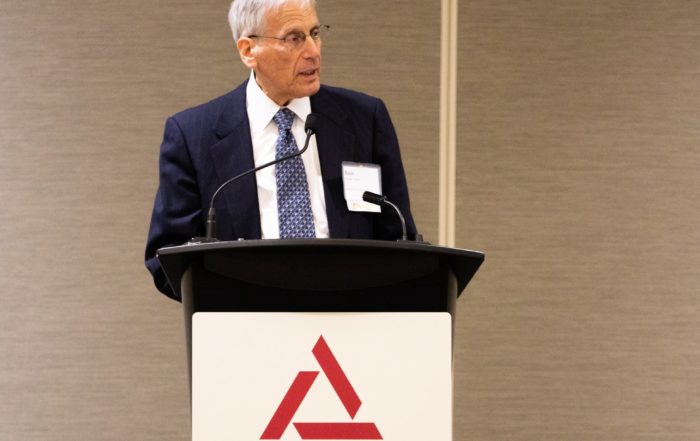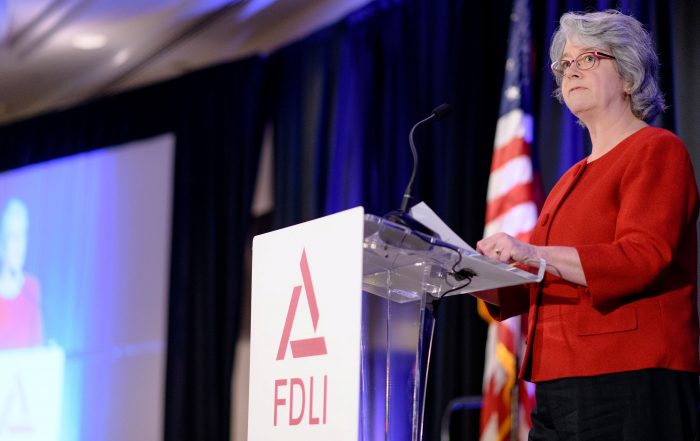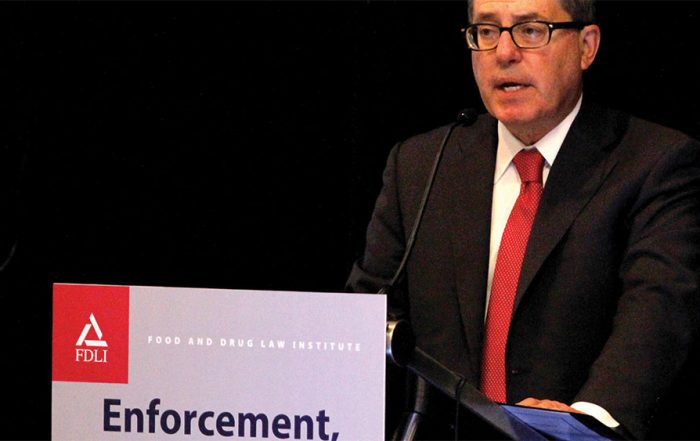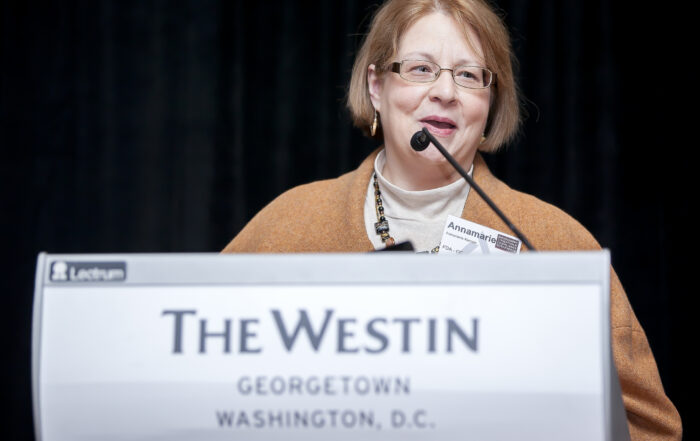5th Annual Eric M. Blumberg Memorial Lecture
The Role of the Federal Agency Attorney Delivered at FDLI’s Enforcement, Litigation, and Compliance Conference
By Ann Wion
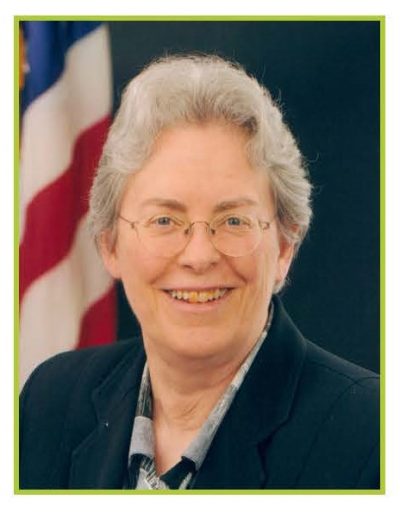 I’m honored to have been asked to speak to you in this lecture series dedicated to Rick Blumberg, a highly respected colleague I worked with for many years in FDA’s Office of the Chief Counsel (OCC). I’d like to focus today on a topic I discussed many times with new attorneys joining OCC—the role of the federal agency attorney.
I’m honored to have been asked to speak to you in this lecture series dedicated to Rick Blumberg, a highly respected colleague I worked with for many years in FDA’s Office of the Chief Counsel (OCC). I’d like to focus today on a topic I discussed many times with new attorneys joining OCC—the role of the federal agency attorney.
Of course, federal agency attorneys have more than one “role” or function, and over the decades there have been interesting articles reflecting different perspectives. I spoke with OCC attorneys on the topic against a backdrop of articles written in the second half of the 20th century—in the 1950’s by Alanson Willcox,1 General Counsel of the Federal Security Agency (a predecessor agency to HHS); in the early 1980’s by Fred Degnan,2 an OCC lawyer who later has spent many years in the private sector; and in the late 1990’s by Thomas McGarity,3 law professor at the University of Texas. We also considered the recommendations for Offices of General Counsel related to the National Performance Review4 conducted by the Vice President’s office in 1993. Although the authors wrote with different focuses and perspectives, their views reflect ongoing interest in the particular roles of federal agency attorneys for more than half a century. I’m certain the debate began well before the 1950’s and continues today. Looking back at issues raised during the second half of the 20th century helps us consider similar issues facing federal agency attorneys now.
“What”
So, what about the “what,” “how,” and “why” of agency lawyers’ roles? Elements of these aspects are inevitably intertwined and not always distinguishable. At the highest level of generality “what” agency lawyers do is to provide legal services. The tasks performed are familiar to you all. Here at an enforcement conference you might think especially about agency attorneys’ work related to enforcement actions: analyzing statutes, regulations, and judicial opinions; reviewing evidence to determine whether an action is supportable; determining the likelihood of success in court; presenting the matter in a referral to the Department of Justice (DOJ); working with the DOJ attorneys to prepare witnesses, to conduct discovery, to draft complaints or indictments, briefs, arguments to the court or jury, appeal papers; and much more. Throughout, OCC’s litigators apply facts to legal standards, draft, edit, construct compelling narratives so that the judicial decisionmakers can understand the public health and legal import of what has happened, and otherwise advocate and negotiate resolutions. OCC litigators similarly play key roles in defensive litigation, again working closely with DOJ attorneys and applying those same outstanding skill sets throughout the course of a case. OCC attorneys also have major roles in administrative litigation, such as civil money penalty proceedings, which have become much more numerous in the tobacco product regulatory context.
At this conference you might also think about the ongoing advice OCC attorneys give to FDA’s various compliance programs, including by reviewing the agency’s manuals on inspections and on regulatory programs. Especially when there is a new program because of a change in the law or a public health tragedy, or both, agency attorneys help construct strategic plans designed to ensure compliance by regulated parties. Examples that come readily to mind include FDA’s plans for inspection and regulation of tobacco-related facilities after the Tobacco Control Act was enacted and of compounding facilities after the Compounding Quality Act became law. Of course, agency attorneys play a major role in advising FDA officials about ongoing inspectional and other individual compliance activities. In addition to having central roles in decisions related to prosecutorial discretion involving particular cases, OCC attorneys provide significant advice on broader enforcement discretion approaches embodied in enforcement policy documents.
As Deputy Chief Counsel for Program Review, I also had the privilege of seeing OCC attorneys apply their considerable knowledge and skills to FDA’s non-litigation related matters. OCC’s counselors also analyze statutes, regulations, and court opinions as they advise FDA officials on programs throughout the agency. They review and revise many different agency documents: regulations, guidance documents, citizen petition responses, warning letters, other correspondence, press releases, congressional testimony and responses to congressional inquiries, proposed legislation, and more. OCC counselors also advise FDA officials in the context of certain individual product reviews, where again the facts presented are analyzed in relation to the legal standard and the adequacy of the administrative record is attended to.
In various contexts, OCC attorneys prepare legal memos in response to agency officials’ inquiries or proposed courses of action. OCC attorneys also help agency officials with strategic planning for important agency initiatives. For example, Commissioner Gottlieb has identified battling the current opioid epidemic and strengthening the generic drug review program as key agency initiatives. OCC attorneys have worked with agency officials to help develop strategic plans to advance these extremely important initiatives. OCC attorneys also have a vitally important role in helping FDA respond to public health emergencies. Whether the situation involves foodborne illness outbreaks, natural disasters, intentionally harmful actions such as terrorism, or serious risks of infectious disease such as pandemic influenza, OCC lawyers work in close cooperation with FDA and other federal agency officials to protect the public health. In all of these tasks, OCC attorneys apply their well-honed skills, such as critical thinking, writing, editing, determining multiple legal options, and applying facts within the legal framework.
In an agency like FDA, there are generally perspectives focused on three main elements: science, policy, and law. Agency scientists tend to describe FDA as a “science-based” agency. Policy makers usually call it a “public health” agency. And lawyers most often call it a “regulatory” agency. Of course, everyone would agree that FDA is all of these, and most agency decisions inevitably involve science, policy, and law. Depending on the situation, one element or another may dominate, but in general the goal is to have a positive public health outcome that is scientifically sound and legally supportable. Who gets to decide in any given case that the decision satisfies the relevant criteria can vary.
Law and Policy
The predominant thinking has been that the agency’s lawyers should not be policy makers. As the HHS Office of the General Counsel (OGC) philosophy statement puts it: “Our job is to provide legal advice and not to make policy.”5 But this is not to say that agency lawyers have no role in policy decision-making. At one end of the spectrum, Willcox, writing more than half a century ago, argued that even in what he called “nonregulatory programs,” those providing benefits such as Social Security benefits, what “may well be the most important [function of lawyers] … lies in the making of a substantive contribution to administrative policy itself. . . .[L]awyers should play a part in shaping policy.”6 Willcox took it for granted that in a regulatory agency the lawyers would make a substantive contribution to policy, likely “automatically or unconsciously, as a result of the agency’s constant concern with the courts.”7 Maybe the essence of this matter lies not in asking whether lawyers should have any role in policy matters, but in asking what that role should be and how it should be implemented.
This question brings us to consideration of the organizational structure of most agencies. That is, in most agencies, including HHS and FDA, those providing legal services are centrally organized within the office of the agency head. HHS OGC is part of the Office the Secretary and FDA’s Office of the Chief Counsel is simultaneously the Food and Drug Division of OGC and part of FDA’s Office of the Commissioner. This structure reinforces the importance of consistency in legal advice and defines the hierarchy of decision-making about legal issues. But it also sets the OGC attorneys structurally apart from those assigned particular policymaking functions.
Writing in the 1950’s, Willcox thought that lawyers, like other professional groups, should have essentially an advisory role in government, except perhaps in the rare case when a decision turned entirely on points of law.8 Writing almost three decades later about FDA’s OCC lawyers, Degnan emphasized that lawyers identify for the decisionmaker issues of law, fact, and policy that should be examined in making a decision and assess the probability that the agency would prevail in a court challenge.9 Discussing the issue almost another twenty years later in the rulemaking context, McGarity stated that while agency lawyers may be free to express their policy views, it critically important for them to “carefully distinguish between legal advice and policy advice.”10
The HHS OGC philosophy statement acknowledges attorneys’ role in policy by declaring “[t]o the extent that we provide advice about policy, we make it clear that we understand that it is not the responsibility of attorneys at [OGC] to make policy decisions.” During my years at FDA’s OCC, I was on occasion asked my views about particular policy choices. If I thought the options under consideration were legally supportable, I—like my OCC colleagues—tried hard to be clear that what I was being asked about and expressing a view on was not a legal issue, but a policy one. Agency decisionmakers need to be confident that agency lawyers are not cloaking personal policy views in the guise of legal advice.
Law and Science
The lines among legal, scientific, and policy issues are not always bright, and these issues are often necessarily intertwined in ways that demand careful, arduous analyses. Building on some work by Rich Cooper, Degnan wrote also about the relationship between law and science and its effects on the relationship between lawyers and scientists.11 Starting from the premise that law is essentially a decision-making device and that science is a process of consensus-building, Degnan argued that, especially in the face of scientific uncertainty, there is an inescapable tension between the lawyer and the scientist.12 Decisionmakers at FDA and other regulatory agencies have to make regulatory decisions based on the facts, scientific understanding, and legal framework existing at the time of the decision. Lawyers often significantly contribute to resolution by asking probing questions about all aspects of the matter, including the nature of the evidence and the scientific support for any position. The lawyers, scientists, and policymakers need to work closely together to understand how the facts of a particular situation fit together within the regulatory framework and how a potential decision makes coherent, defensible sense.
“How”
Which brings us to consider the “how” of the agency lawyer’s role. Willcox emphasized the importance of “close and informal day-to-day contact”13 between lawyers and administrators. He argued that such a close and collaborative working relationship, in which the lawyer knows the program thoroughly, is essential to providing sound legal advice.14 In the federal government, it can also be critically important for attorneys from various agencies to work collaboratively as the agencies work together to solve major problems. The effective collaborations of agency attorneys from FDA, CDC, USDA, and other agencies were essential to the government’s successful protection of Americans from the risks of monkeypox (after imported African rodents had infected prairie dogs in the U.S.) and from Creutzfeldt-Jakob disease (after BSE, or “mad cow’s disease,” became widespread in other countries).
The 1993 National Performance Review report harkened back to a distinction attributed to President Franklin Roosevelt’s solicitor general, Oscar Cox, who referred to “cold lawyers” and “hot lawyers.” “Cold lawyers” are satisfied with advising program managers that proposals are legally unacceptable, but don’t offer options or describe relative legal risks. The preferred “hot lawyers” ask what the program managers are trying to achieve and work with them to develop acceptable options and specify associated legal risks.15 The agency general counsels convened by ACUS to respond to the report endorsed the concepts of “frequent and regularized contacts between lawyers and program staff” and early and continued involvement of the lawyers in agency initiatives.16 The general counsels also agreed that the lawyers should present appropriate alternatives if a proposed management initiative was deemed legally unacceptable.17
The much more controversial recommendations of the National Performance Review report concerned the definition of “clients” or “customers” and the use of “franchising and other market mechanisms” to encourage OGC staffs to respond appropriately to their clients.18 The report noted that a federal agency attorney could view the client as, among others, the President, the Secretary of the department, the head of an agency within the department, the mid-level official posing a question to OGC, or the public at large. The report concluded that OGCs have many customers and that confusion among OGC staff about who the client is leads to dissatisfaction among program managers who believe they are the client. The resulting recommendation was to subject the OGC legal advice function to “market forces” by allowing line managers to select who they want to receive their legal advice from.
As you can imagine, the general counsels assembled by ACUS took strong exception to this recommendation. The general counsels argued that defining the federal attorney’s client using the private bar’s concept of “client” is not the best way to increase the effectiveness of federal OGCs.19 They stated that “the ‘client’ concept is less suitable to the public sector, where the relationship among agency officials, managers, and lawyers is inherently complex, and the identity of the clients may vary according to the nature or stage of the matter, even in a single case.”20 Many of you are familiar, for example, with FDA’s separation of functions regulations21 and OCC’s practice of assigning different attorneys to represent the initiating FDA Center and the Commissioner in an administrative action involving a hearing. The general counsels also did not believe that “franchising”—permitting program managers to shop for legal services—would “ensure consistent, reliable, high quality legal services.”22 These goals take us back to the main reasons for having centralized legal services with OGCs as separate entities within the office of the Secretary and the general counsels in charge of legal opinions.
“Why”
Which also brings us to the “why” of agency attorneys’ functions. When you examine particular OGC statements of purpose you generally see various aspects of the role of agency attorneys combined. For example, the HHS OGC philosophy statement begins: “Our ultimate philosophy is to provide the highest quality legal services in order to assist the Department in establishing and maintaining programs that advance health and human services.”23 Similarly, FDA’s OCC vision statement begins “The Office of the Chief Counsel promotes FDA’s public health mission by providing the highest quality legal services from a staff that is dedicated to integrity, excellence, and respect.”24 FDA’s statutory mission25 to promote and protect the public health guides not only agency officials’ policy views, but also agency lawyers’ interpretations of the law.
Willcox premised his article on the importance of a “government of laws.”26 In his view, consistency, rationality, evenhandedness, and objectivity are “of the essence of our [American] concept of government.”27 And Willcox believed that agency lawyers’ training and experience made them especially alert to the need to test administrative decisions against these criteria, against applicable statutes, and against such fundamental constitutional principles as due process and equal protection of the law.28 Among the prominent roles for agency attorneys McGarity discussed decades later were those of interpreting the statutes the agency is implementing and advising on procedures agencies must follow under the Constitution, the Administrative Procedure Act, and individual agency statutes.29
Degnan pointed to various definitions of the role of lawyers from the courts and from the bar associations’ professional responsibility codes.30 He also referred to Supreme Court Justice Brennan’s view that the “ultimate role and responsibility of any lawyer are to uphold the law.”31 Rick Blumberg believed in vigorously and responsibly upholding the law and inspired generations of OCC lawyers to do so.
In the end Degnan offered an analysis of the famous Shakespeare quote from II Henry VI: “The first thing we do, let’s kill all the lawyers.” Degnan pointed out that the line is spoken by a revolutionary trying to overthrow the king. Degnan viewed the line as “the sincerest compliment to lawyers, particularly government lawyers.”32 Lawyers try to make sure that decisions are made “compatible with and in appreciation of the law,” and that role is anathema to anyone who “wants nothing of decision-making measured by the prevailing legal standard.”33
Of course, most people inside or outside of the U.S. government are not trying to overthrow the government. But most people do want to do what advances goals they care about, and that desire can make some want to downplay or even disregard legal constraints on how they want to proceed. Here’s the bottom line: The role of the federal agency attorney matters because in a democracy the law matters.
Ann H. Wion was in the Office of the General Counsel, Department of Health and Human Services (DHHS), Food and Drug Division, from 1979 to 2017. She received a PhD from Cornell University and a JD from Stanford Law School. After joining the DHHS Office of General Counsel in 1979, she specialized primarily in drug and biologics law. From 1993 to 2013 she was Deputy Chief Counsel for Program Review and oversaw the attorneys providing legal counsel in DHHS on FDA-related matters. From 2014 to 2017 she was Senior Advisor to the Chief Counsel.
- Alanson W. Willcox, “The Lawyer in the Administration of Nonregulatory Programs,” 13 Public Administration Review 12 (1953) (Willcox).
- Frederick H. Degnan, “The Role of the Lawyer in Agency Decision-Making,” 36 Food Drug Cosmetic Law Journal 510 (1981) (Degnan).
- Thomas O. McGarity, “The Role of Government Attorneys in Regulatory Agency Rulemaking,” 61 Law and Contemporary Problems 19 (1998) (McGarity).
- “SMC Recommendation 04: Increase the Effectiveness of Offices of General Counsel,” Office of the Vice President, Accompanying Report of the National Performance Review, Streamlining Management Control (SMC) (September 1993) (National Performance Review Report); “Recommendations To Increase the Effectiveness of Offices of General Counsel,” Office of the Chairman, Administrative Conference of the United States (October 1995) (ACUS Implementation Group Recommendations).
- “Philosophy of OGC,” HHS OGC New Employee Orientation Manual at 17 (July 2014) (HHS OGC Manual).
- Willcox at 15.
- Willcox at 15.
- Willcox at 13.
- Degnan at 510, 512.
- McGarity at 29.
- Degnan at 512-514 (referring to Richard M. Cooper, “Scientists and Lawyers in the Legal Process” (unpublished paper)).
- Degnan at 514.
- Willcox at 13.
- Willcox at 14.
- National Performance Review Report at 27.
- ACUS Implementation Group Recommendations at 6.
- ACUS Implementation Group Recommendations at 6.National Performance Review Report at 28-29.
- ACUS Implementation Group Recommendations at 3-4.
- ACUS Implementation Group Recommendations at 3.
- See 21 C.F.R. 10.55.
- ACUS Implementation Group Recommendations at 4.
- HHS OGC Manual at 17.
- FDA Office of the Chief Counsel, Vision Statement (1999).
- See 21 U.S.C. 393 (section 1003 of the Federal Food, Drug, and Cosmetic Act).
- Willcox at 12, 16.
- Willcox at 12.
- Willcox at 12.
- McGarity at 22-26.
- Degnan at 515.
- Degnan at 515-516 (referring to S.J. Friedman, An Affair with Freedom: William J. Brennan, Jr., p. 328, Atheneum, New York (1967)).
- Degnan at 516.
- Degnan at 516.



